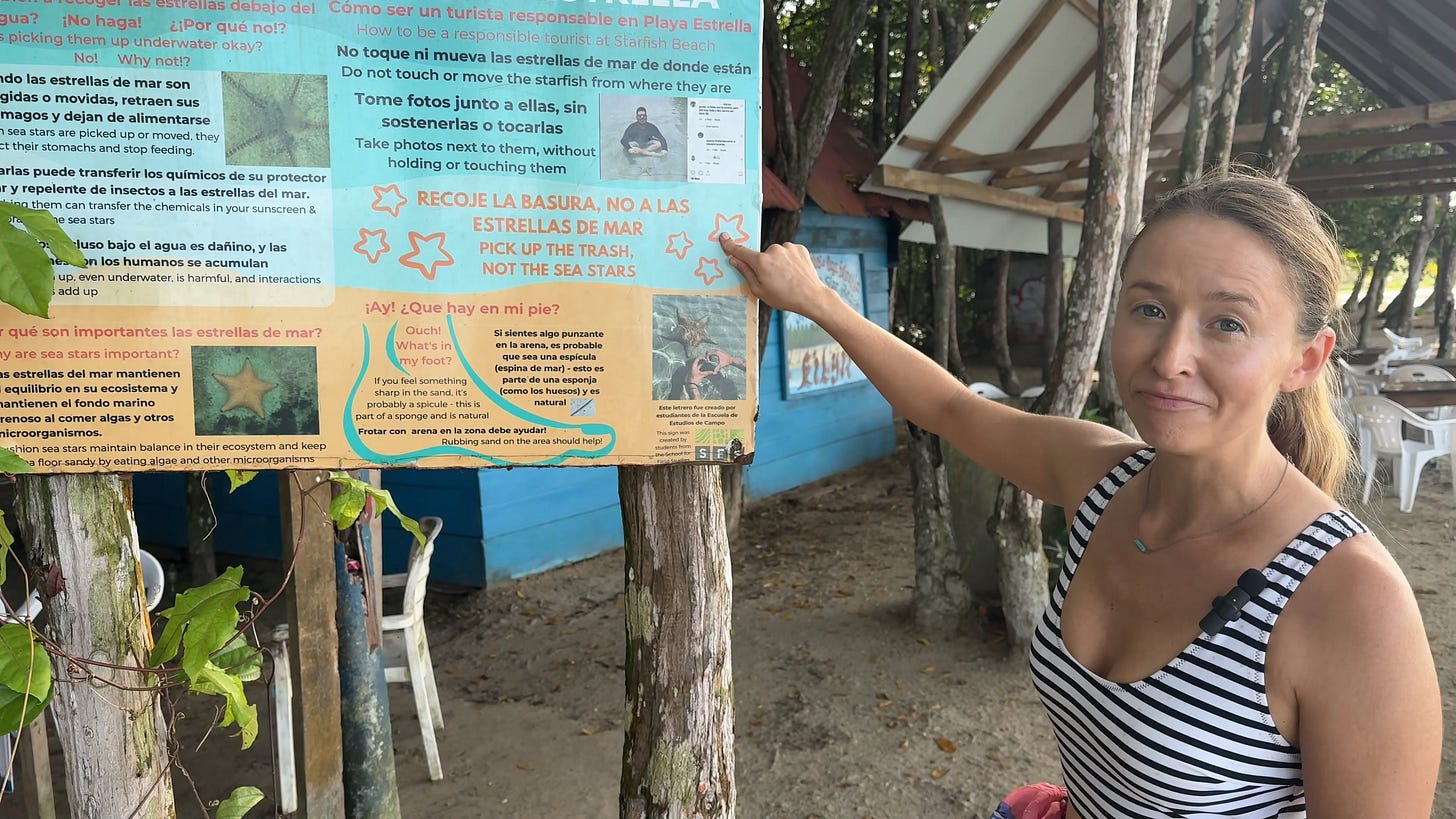Photo for a Life. When Should We Speak Up?
I can't stop thinking about the price of inaction...
You can find our YouTube video episode about this place below …
She wants it, that photo. The starfish is in her hands. She looks at it with an Instagram smile. Her boyfriend is five feet away, bending over with the phone, just inches above the clear water, looking for angles. He takes a few seconds, then a minute, then more. Enough time for a stellar image. Enough time for the starfish to die.
She wears a stylish hat, propped atop thick curly hair. Her swimsuit has golden rings between the breasts and on the hips. The face is in makeup, out of place on the beach, and in the water. She could be pretty if not for the ugliness of the action.
“I hate them,” Alex says.
“Fuck them,” I agree.
But we say nothing to them. Should we have?
Playa Estrella is a gem in Bocas del Toro, Panama. Starfish Beach. The stunning, calm waters of the bay attract the tourists and starfish. Starfish are still here. Once, it was abundant, but the number is dwindling, losing to the race for ‘likes.’ The situation is not yet dire, and the efforts to conserve are yielding results.
The locals understand the dynamic of the struggle between tourism and the starfish. The growth of one impedes the survival of the other. So they put up signs explaining to new arrivals the harm they cause by picking up the starfish, often killing them.
The starfish are not fish at all. They are echinoderms, from the family of sand dollars and sea urchins. They don’t have a heart, nor a brain, nor blood. Their vascular system pumps seawater around their body, propels their movement, digestion, and life. Taking them out of the water, even for a bit, disrupts the system. Imagine sucking a litter of blood out of your human body each time you smile for a camera.
Yet, we say nothing, just seethe with indignity.
You can watch our video episode about about Starfish Beach on YouTube:
I could walk up to the lady and politely explain the harm she is about to cause. I may have done so in the United States. I’d convey my message politely, with a quiet force. I have sufficient command of English.
I could tell her about the second external stomach of the carnivorous starfish. They are like aliens. They push the second stomach out and digest their prey outside the body, then suck it back in to distribute the nutrients with the internal currents of seawater. That may gross her out enough to set the animal on the bottom.
But my Spanish skills are stuck at the basic daily chat. It lacks polish and nuance, so I can only master direct statements, which in the circumstance will translate as confrontational. That boyfriend is big, I don’t want a tussle.
And I am a tourist. Well, I live in Panama now. But still, I am in their country for only a time. I cling to that excuse. I stay put. Instead, I look around for the proprietors of the stalls, in the hope that they see the woman and say something. They are all busy selling beer or looking at their phones.
The photo session ends, and the couple sits back down on the sandy bottom in the warm and shallow bay. She sets the starfish two feet away in the water, then forgets. They banter and chat and point around.
We watch the animal from a distance, through the clear water. It slowly curls its feet upwards. It flips and floats near the bottom, upside down, in a way the starfish should not do. Then it drifts towards shore on the waves from the passing pangas and gets stuck at the edge of the beach.
Soon, the couple wades to shore. The man picks up the upside-down starfish by one foot and flings it like a Frisbee into the deeper water. Too late, my friend, I think.
I could have said: maybe it is your country, but it is my planet. Our planet. And you just took away a moment of joy from a kid or an adult who could have watched this starfish slowly prowl the sand.
They caused harm. I hope not out of malice but ignorance. Although that is hard to defend in light of the many signs on the beach. But I am complicit in my silence. Social media is complicit with their ‘likes.’ Many of us are complicit in rewarding ‘the experiences’ we see in photos while scrolling without the consideration of the harm they may have caused.
Will I say something next time? The sad truth is that most likely not. I am averse to conflict where I am handicapped. But just in case, I now have a speech prepared in a local flavor of Spanish.
“Hola, amiga. Esta estrella de mar está bien bonita.
Es un animal raro: en vez de sangre, usa agua del mar para vivir.
Cuando está fuera del agua, pierde mucha y a veces se muere.
Sacarlas seguido las puede matar.
¿Será que la puedes poner de vuelta al agua? Gracias.”





That casual ignorance and use of nature as a prop for photos makes me crazy as well. Happens anywhere.
I understand your predicament. I've witnessed environmental ignorance and held back from an approach for good reasons. Other times I was able to intervene before harm was done. Thank you for sharing your experience and feelings. It will help people tune into nature. Too many of us are disconnected. 🌐🌞